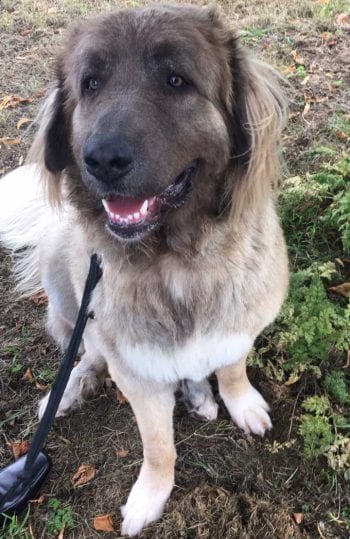17 Dec 2020
Surgeons at Wear Referrals have performed two operations to remove a tumour the size of a man’s fist from the skull of an 11st Caucasian shepherd dog.

A hi-tech 3D digital reconstruction of Molly’s jaw, which specialist surgeon Jon Hall and colleague Mark Gosling created for the operation, alongside the rare and aggressive tumour removed from her skull.
Specialists at Wear Referrals in County Durham have removed an aggressive tumour the size of a grown man’s fist from the skull of an 11st Caucasian shepherd dog.
Wear’s Jon Hall, an RCVS and European specialist in small animal surgery, led Molly’s treatment, including carrying out the two intricate operations in which absolute precision was essential to avoid damage to Molly’s brain, eye and jaw.
Mr Hall used a 3D digital reconstruction of Molly’s jaw to help him plan the surgery and ensure the initial eight-hour procedure was a total success.
Mr Hall said: “Molly had a huge tumour called a multilobulated osteochondrosarcoma located in her mandible, which had grown into her orbit.
“It’s a rare condition, but usually if this type of skull mass can be completely removed then the long-term prognosis for the animal can be good.”
Part of the challenge facing Mr Hall and the team at Wear was to remove all of the mass, while making sure Molly would be able to use her jaw normally afterwards and still have a good quality of life.
However, the cancer was getting so big it was also pushing through Molly’s cheekbone, causing her eye to bulge, and through her cranium, putting pressure on her brain.

Mr Hall added: “This presented us with a real difficulty, as major vessels and nerves around the huge mass would be hard to identify, creating the risk of life-threatening bleeding, permanent damage to important nerves or fatal injury to her brain.
“However, using the sterilised 3D model meant that every bone cut could be planned with exceptional accuracy and guide the complex surgery on the day.”
The operation proved a total success and Molly was sent to The University of Edinburgh to begin a course of radiotherapy.
However, the cancer stubbornly resisted the treatment and grew back aggressively, putting four-year-old Molly back in danger, despite additional radiotherapy treatment.
Mr Hall said: “It’s very unusual for this type of tumour to be so biologically aggressive, so it was a very surprising and disappointing development.
“Usually you would not attempt a second surgery in a location such as this – especially following radiation treatment, which can damage the tissues.”
Mr Hall continued: “However, after discussing the scenario with Molly’s owner, we decided a second operation was the best option in the circumstances as she was suffering pain again and struggling to open her mouth.
“Again, the operation went very well, and now Molly is undergoing chemotherapy and is responding well.
“The disease is stable, and she is bright, comfortable and doing really well. She’s certainly a remarkable dog and has battled bravely all through this ordeal.”